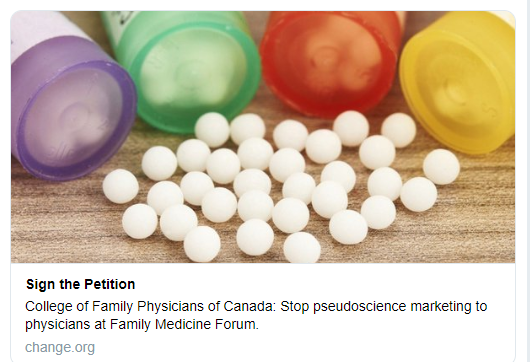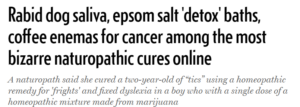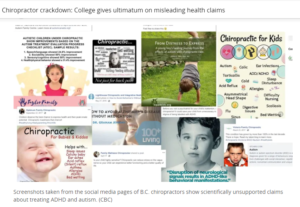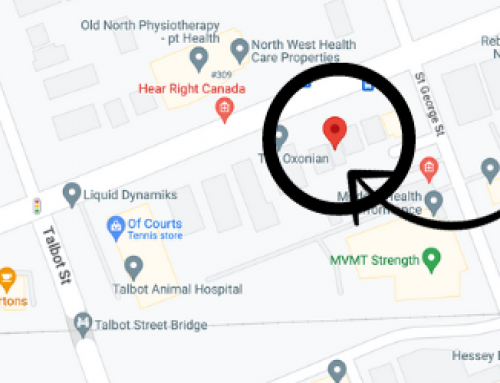These are interesting times in the world of family medicine. Not only are we in Ontario in the midst of discussing our role, and even questioning our future, as family physicians during contract arbitrations with the government, we are also seeing many of us take a stand against the promotion of pseudoscience at our upcoming national conference.
Vendors such as Pascoe Canada Inc., Boiron Canada Inc, and others who make homeopathic and naturopathic products will be promoting their wares to physicians attending the Family Medicine Forum, a conference put on by the College of Family Physicians of Canada and being held in Toronto on Nov 14–17, 2018. This has led to some understandable questions and push back.
The reason this is creating some controversy is that there is evidence that homeopathy and most naturopathic products have no benefit beyond the placebo effect, and its marketing as a medicine is counter to what we strive to do as physicians. Now I understand that many people would question why pharmaceutical companies should then be allowed to promote their products; I personally would prefer an industry-free conference but at least we have clear minimums in place regarding what level of evidence and safety a drug has to have in order to be approved, as well as clear guidelines regarding the permitted relationship between the drug industry and practitioners. This is not present with homeopathic and naturopathic products and this direct promotion of pseudoscience at our own conference has prompted many of us to say, “Enough is enough.”
In fact, there is a significant group of physicians and individuals who think we’ve long passed the point of “enough is enough” when it comes to the marketing of products to the public with no evidence of benefit and limited proof of safety even. Simply walk down the street, read your local paper, or take your chances online and you will see numerous examples of things that make most of us physicians cringe:
- Pharmacies that place homeopathic and naturopathic products alongside conventional medications with no distinction whatsoever between them
- Naturopathic and Chiropractic clinics advertising “alternatives to the flu vaccine”
- A birthing center bragging about parents declining Vitamin K and newborn screening for their baby
- The never-ending promotion of detoxes and cleanses
I have been seeing this rise in pseudoscience and rhetoric and it causes me concern. I finally got to the point where I was tired of being silently on the sidelines watching this go on, and felt I needed to enter the fray in same way, shape, or form. So I decided to write a book – entitled Healthier You: A Family Doctor’s Guide to the Fundamentals of Better Living – with a clear focus on critical thinking and assessing health claims. Three chapters focus on this fairly explicitly – Think, Vaccinate, and Supplement? My goal was to present this information in a way that was encouraging, practical, and without judgement or scolding.
My first hurdle though was just getting over the idea of “who am I to write this?” I’m just one family doctor against this avalanche of misinformation. But then Philippe Chouinard is just one family physician who started a petition to address the issue of these vendors at the Family Medicine Forum, and we are now having a national discussion about it. Dr. Jennifer Gunter is one gynecologist who decided to keep writing and addressing the endless pseudoscience presented to women, and now has a huge audience and is making a real difference in the health information available around women’s health. Tim Caulfield is one professor of health law and science policy who began writing and speaking about celebrity and pseudoscience; he now has a show on Netflix (A User’s Guide to Cheating Death – which is awesome, by the way) that helps debunk health myths. One person can do a lot, and we are all on the same team working towards a common goal of improving health communication.
I think it’s time we as a profession, and as a community of thinkers, stand up and start speaking out against this misinformation. We need to demand more accountability and more evidence before we allow direct promotion of products to the public and to our profession. This is becoming a public safety issue and if Canada Food Inspection Agency, Health Canada the FDA are unable to intervene then I would hope our professional bodies would do so. There are so many opportunities for them to stand up for science. I would love to see:
- The College of Family Physicians of Canada have stricter standards for vendors in upcoming conferences, or even try to be industry-free.
- Chiropractic colleges and Naturopathic colleges clamp down on advertisements that are without evidence or go beyond their scope of practice. (In one promising example, the BC College of chiropractors has given all chiropractors in that province until Nov 1 to remove all scientifically unsupported claims from their websites, social media sites, and printed advertising).
- Pharmacies either no longer stock homeopathic items with no benefit or ensure clear distinction from medical products to avoid confusion
- Medical associations and physicians be more upfront and clear about their connections with industry
Until then, it is up to all of us who feel this way to speak up and do our little part to stand up for science. I’m in – and hopefully we can continue adding more voices to drown out the noise which can be confusing, distracting, and dangerous.
Vineet Nair is a family physician in London, ON and author of Healthier You: A Family Doctor’s Guide to the Fundamentals of Better Living. The opinions expressed in this post are his own.





